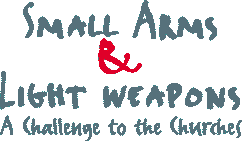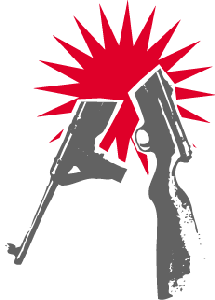
The briefing, hosted by the WCC, focused on possible measures of governmental and non-governmental response to the proliferation of small arms and light weapons.
Peter Batchelor, director of the Small Arms Survey Project at the Graduate Institute of International Studies of the University of Geneva, spoke on dimensions of the small arms problem. |
  International Action Network on Small Arms International Action Network on Small Arms Graduate Institute of International Studies Graduate Institute of International Studies Quaker UN Office, Geneva Quaker UN Office, Geneva International Peace Bureau International Peace Bureau Women’s Inter'l League for Peace and Freedom Women’s Inter'l League for Peace and Freedom NGO Committee for Disarmament NGO Committee for Disarmament |
